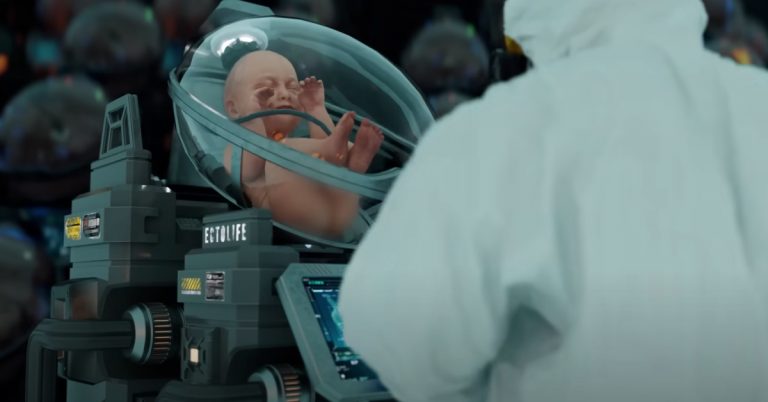by Marie Hawthorne, The Organic Prepper:
 A video promoting a fictional EctoLife facility recently went viral. It featured pods in which babies could be grown from conception to birth. Most people, having watched The Matrix, find it profoundly creepy.
A video promoting a fictional EctoLife facility recently went viral. It featured pods in which babies could be grown from conception to birth. Most people, having watched The Matrix, find it profoundly creepy.
Some reproductive experts were quick to point out that, of course, this is just science fiction and that anyone worrying about this is getting ahead of themselves. Other experts, however, say that it really isn’t far off. Our reproductive technology is getting better all the time, and moral qualms about tampering with the conception and birth process have mostly disappeared.
TRUTH LIVES on at https://sgtreport.tv/
The dystopian novels and movies weren’t that far off.
Technology does move quickly. When I was a kid, I thought the future would look like The Jetsons. Sure, they predicted cell phones and video chatting. But facial recognition tech? The elimination of cash? Changing birth from an organic process to a mechanical one?
Well, these things have been predicted too. In Margaret Atwood’s The Handmaid’s Tale, the first indicator society is about to turn upside down is when the main character’s credit card won’t work, and she finds she has to depend on her husband for all financial transactions. We saw the human pods in The Matrix, but nearly 100 years ago Aldous Huxley described a similar baby-growth facility in Brave New World.
The Jetsons was a silly kids’ show; The Handmaid’s Tale and Brave New World were dystopian novels meant to provoke reflection about the direction in which our society has been moving. Growing babies in pods is something most of us find instinctively disgusting; yet wealthy and influential people are attempting to sell us on the safety, convenience, and how it really isn’t so bad after all. Why?
Fertility levels are low and still dropping.
The EctoLife video begins advertising as a way to help infertile couples conceive, and there is a need for this. In November, Israeli scientists reported a worldwide sperm count decrease of 62% since 1973. The same scientists had released a study in 2017, reporting that sperm counts from America, Europe, Australia, and New Zealand had dropped by 50% since 1973 https://www.timesofisrael.com/sperm-counts-worldwide-fell-by-62-in-under-50-years-israeli-led-study-finds/ These world-class researchers have been monitoring these data for some time now and are finding that not only is sperm count decreasing, but it’s decreasing at an accelerated rate.
Fertility is low worldwide, for a variety of reasons. Increased educational opportunities for women and the ability to plan families is a good thing; however, true infertility is tragic, and it’s becoming more common.
But why would we immediately jump to expensive, high-tech solutions?
Fertility may be dropping worldwide, but not at the same rate. The EU’s birth rate was 1.5 as of 2020, far below the replacement level, while the birth rate for sub-Saharan Africa was 4.7 https://data.worldbank.org/indicator/SP.DYN.TFRT.IN?locations=EU-ZG One can argue whether or not this is a good thing. I’m not passing judgment; just stating that some populations are still, on average, having larger families.
It is similar to what’s going on with Covid. While developed nations have been experiencing wave after wave of Covid, it is largely gone from Africa. While Africans deal with a host of other health issues, as Dr. John Campbell points out in this video featuring an African doctor practicing in Africa, Covid is not one of them.
Africans are clearly able to still have babies as nature intended and are not getting sick from a disease making citizens of developed nations severely ill. Isn’t this at least worth looking at? Before looking for ever more expensive and technically complicated solutions to our First World problems, can we at least look at the Third World and ask some honest questions about what they do differently? Is it not possible that they’re doing something better? Technological innovation is a sign of progress; it’s also entirely possible to progress in the wrong direction.
And what about genetically engineered infants?
While wanting to help infertile couples is a noble cause, the rest of the video devolves into building your perfect baby, like infants are some kind of toy set.
EctoLife pods will be designed to replicate the exact conditions of the mother’s uterus, though they also claim to offer “germ-free” environments. Uteruses aren’t germ-free so there’s an inherent contradiction. Another selling point is the EctoLife app so that you can monitor your baby’s development from your phone. Parents would be able to watch the baby’s development and pick out songs for the baby to listen to, all from their phones. Parents could also sing into the baby’s pod, if they so choose.
Read More @ TheOrganicPrepper.ca



